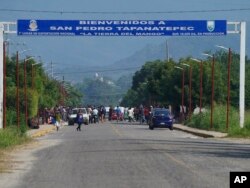Migrants, especially Venezuelans, are struggling with a new United States policy meant to prevent border crossings. And many Venezuelan migrants trying to enter the U.S. are now stuck in a small town in southern Mexico.
The town of San Pedro Tapanatepec had 7,000 migrants when The Associated Press visited at the beginning of October. About 75 percent were Venezuelans. Just weeks later, Mayor Humberto Parrazales estimated the number was now 14,000. The town has a population of just 15,000.
Many Venezuelans had planned to make their way to the U.S. border. But the new U.S. policy says only those applying online, and arriving by air, will be admitted. Border crossers by foot will be expelled. That leaves many living in Tapanatepec in five large tent shelters wondering what they will do next.
San Pedro Tapanatepec is not where the migrants wanted to be. The town is about 300 kilometers from the border with Guatemala.
Since August, the town has served as a stop for migrants. They would wait there for a few days while Mexican immigration officials gave them a travel pass to make it to the U.S. border.
But Parrazales said the process for giving out the passes has slowed down. Now many more migrants wait in Tapanatepec, a poor town unprepared for so many people.
“I don't understand anything," Venezuelan migrant Robinson Rodríguez said by phone from Tapanatepec. “If everything at the border is closed, then they shouldn't be handing out these passes. And if you ask (the officials), they say they don't know, but they keep handing them out.”
The migrants do not have much time. Rodríguez had received a seven-day travel document, which required him to leave Mexico within a week. But he had to use his time raising money to pay for transportation to the northern border. But by the time he got the money, his pass had expired.
Many people are confused. Nicaraguan migrant Luis Martinica showed a paper with an internet link for Venezuelans to apply. But he wondered if he, a Nicaraguan, would be expelled at the U.S. border.
Mayor Parrazales has his own problems. The town can no longer provide the electricity needed for the camp. Health care, cleaning and water are also problems.
Still, migrants are bringing in some money to the town. Parrazales said the town has seen about $15 million in extra business selling migrants food, places to sleep, medicine, taxi and bus rides. He said they pay money to charge their phones.
Mexico has released about 77,000 passes to Venezuelans so far this year, mostly in the last three months. Because of political reasons, Venezuelans, like Cubans, are hard to expel, both for Mexico and the United States.
Mexico's National Immigration Institute did not answer questions from the AP about how the camp will be operated following the new U.S. policy.
“There is a big lack of information,” Parrazales said. “This is a pressure cooker I'm trying to contain here.”
I’m Dan Novak.
Dan Novak adapted this story based on reporting by The Associated Press.
______________________________________________________________________
Words in This Story
expire — v. to no longer be valid after a period of time
confused — adj. unable to understand or think clearly
pressure cooker — n. a situation or place that causes you to feel a lot of stress or pressure







Forum